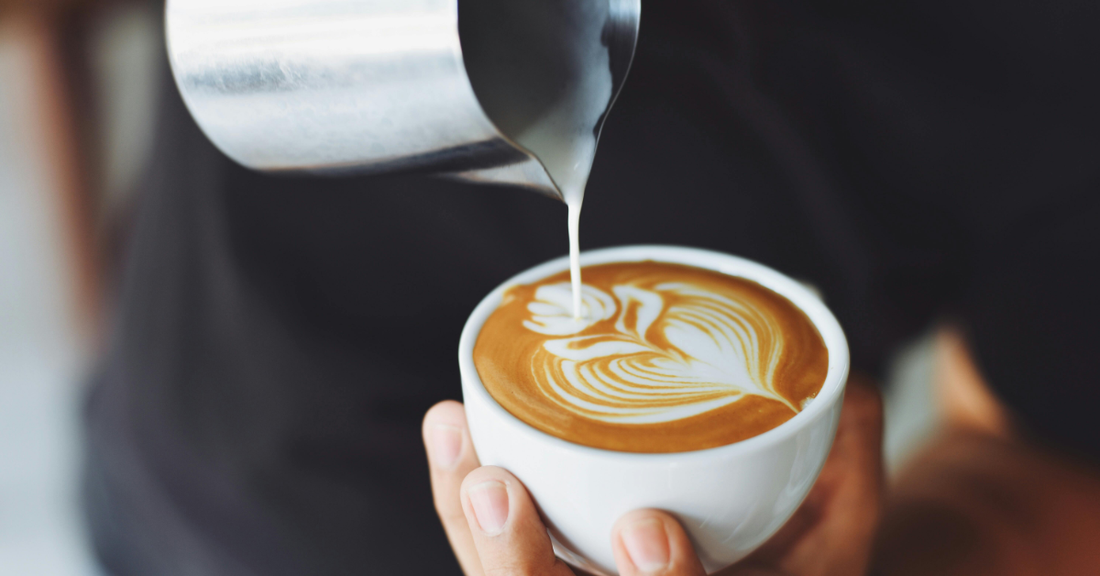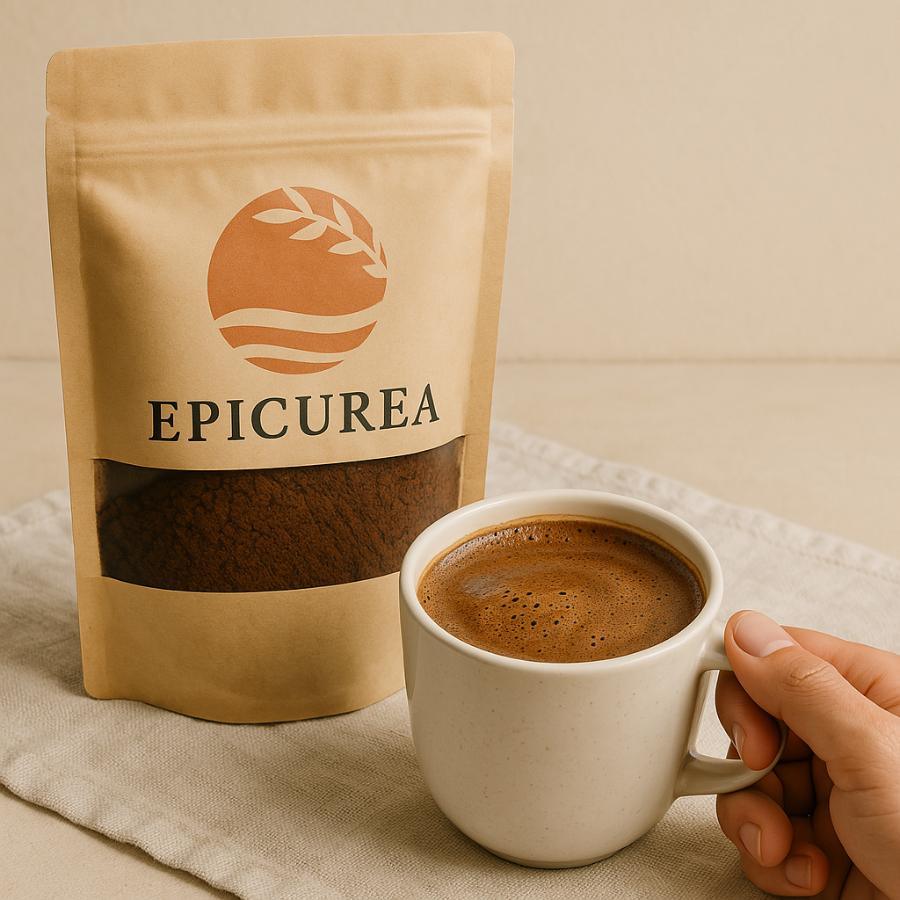
Caffeine-Free Coffee: The Complete Guide to Coffee Without Caffeine
What is Caffeine-Free Coffee?
Caffeine-free coffee refers to beverages naturally created without caffeine, offering the flavor and ritualistic experience of coffee without any stimulating effects.
It differs significantly from decaf coffee, which undergoes processing to remove caffeine.
True caffeine-free coffees include alternatives made from herbs, fruits, grains, and other botanicals.
Types of Caffeine-Free Coffee

Herbal Coffee
Herbal coffees are typically brewed from roasted herbs, roots, grains, and seeds such as chicory, dandelion root, barley, and carob.
They offer a robust flavor similar to traditional coffee without caffeine.
Fruit and Nut Coffees
These coffees use ingredients like date seeds, figs, almonds, and pistachios.
They tend to have unique flavor profiles ranging from nutty to fruity.
Mushroom Coffee
Mushroom coffees blend adaptogenic mushrooms like chaga, lion’s mane, and reishi with other herbs or spices.
They’re caffeine-free or low-caffeine and are praised for potential health benefits such as immune support and cognitive enhancement.
Benefits & Myths of Caffeine-Free Coffee
Proven Benefits
- Caffeine-Free: No jitters or energy crashes.
- Sleep-Friendly: Supports restful sleep.
- Rich in Antioxidants: Promotes cellular health.
- Digestive Comfort: Easier on sensitive stomachs.
Common Myths Debunked
-
Myth: Flavorless or bland.
Truth: Many caffeine-free coffees have rich, distinctive flavors. -
Myth: Only decaf coffees are caffeine-free.
Truth: Natural caffeine-free options exist without chemical processes. -
Myth: No health benefits.
Truth: Rich in antioxidants and beneficial compounds.
Comparing Caffeine-Free Coffee with Alternatives
Traditional Coffee
Contains 80–120 mg of caffeine; stimulates short-term productivity but can cause jitters and sleep disturbances.
- Pros: Immediate energy boost, widely available.
- Cons: Can cause jitters, anxiety, sleep issues.
- Best For: Those seeking short-term productivity boosts and who tolerate caffeine well.
Decaf Coffee
Has minimal caffeine due to processing; taste and beneficial antioxidants often compromised by chemical extraction.
- Pros: Lower caffeine content, widely available.
- Cons: Chemical decaffeination can impact taste and antioxidant levels.
- Best For: People who want minimal caffeine but prefer traditional coffee flavor.
Tea
Lower caffeine (0–40 mg) but flavor profiles and antioxidants differ significantly from coffee alternatives.
- Pros: Lower caffeine, variety of flavors, rich in antioxidants.
- Cons: Flavor profiles differ significantly from coffee.
- Best For: Individuals who enjoy mild flavors and moderate caffeine.
Mushroom Coffee
Generally contains 0–50 mg caffeine; adaptogenic mushrooms provide health benefits distinct from other caffeine-free coffees.
- Pros: Adaptogenic health benefits, cognitive enhancement, immune support.
- Cons: Distinct earthy taste that might not appeal to everyone.
- Best For: Health-conscious individuals interested in functional foods.
Herbal Coffee
Typically caffeine-free; made from roasted grains, herbs, and roots, offering flavors ranging from earthy to nutty.
- Pros: Naturally caffeine-free, digestive benefits, robust flavor.
- Cons: Flavors can vary widely, may feel too thin compared to coffee
- Best For: Those sensitive to caffeine, seeking digestive comfort.
Who Should Drink Caffeine-Free Coffee?

Morning Ritual Seekers
Individuals seeking a calm, mindful start to their day benefit from caffeine-free coffee by reducing anxiety and creating a grounding morning routine.
This provides a sense of peace, presence, and mindful connection to their daily rituals.
Expecting Mothers
Pregnant women benefit greatly from caffeine-free options, eliminating caffeine-related health concerns and anxiety over hidden stimulants.
Caffeine-free coffee provides comforting assurance and a safe yet delicious way to nurture themselves during pregnancy.
Evening Unwinders
Those needing relaxation at day's end find caffeine-free coffee ideal, as it supports restful sleep without sacrificing the sensory pleasure of a comforting beverage.
It aids in stress relief, creating a soothing nightly ritual.
Health Conscious Individuals
People sensitive to caffeine due to dietary or medical reasons find significant relief with caffeine-free alternatives, supporting overall well-being without sacrificing enjoyment.
Health Implications of Switching to Caffeine-Free Coffee
Enhanced Sleep Quality
Improves sleep onset, duration, and overall sleep hygiene by removing stimulating effects of caffeine.
Reduced Anxiety and Stress
Eliminating caffeine helps reduce anxiety and promotes mental calmness.
Digestive Improvement
Caffeine-free alternatives typically reduce gastrointestinal discomfort commonly associated with caffeinated beverages.
Popular Ingredients in Caffeine-Free Coffee Alternatives

- Chicory Root: Roasted chicory offers a coffee-like bitterness and is known for digestive health.
- Dandelion Root: Often blended with chicory, praised for liver support.
- Carob: Sweet, chocolate-like flavor; rich in antioxidants.
- Adaptogenic Mushrooms: Boost immune health and cognitive function.
- Figs and Dates: Provide sweetness and additional fiber.
How to Choose the Best Caffeine-Free Coffee
Consider taste preference, health objectives, brewing methods, and dietary requirements.
Look for clean labels, sustainable sourcing, and genuine user reviews.
Brewing Tips for Optimal Flavor
- Temperature Control: Use water just below boiling to maintain delicate flavors.
- Brewing Time: Adjust steeping duration according to the specific ingredients used.
- Freshness: Store properly and use fresh ingredients for best flavor.
Highlight: Caffeine-Free Wild Pistachio Coffee

EPICUREA’s Wild Pistachio Coffee draws from a centuries-old Mediterranean tradition known as menengiç kahvesi, historically enjoyed in regions like Southeast Turkey.
What is wild pistachio coffee? Traditionally prepared from wild terebinth fruit (wild pistachio), this coffee alternative has deep cultural significance and unique flavor characteristics.

Unique Health Benefits:
- Naturally Caffeine-Free: No chemical processes involved as the fruit are naturally free of caffeine.
- Unique Taste: Creamy texture with nutty-citrusy flavors.
- Terpenes: Contains beneficial terpenes like alpha-pinene and limonene, known for respiratory support and mood enhancement.
- Rich in Antioxidants: High in luteolin-rich polyphenols promoting cellular health and anti-inflammatory benefits.
- Digestive Friendly: Gentle on the stomach, ideal for those with sensitivities to traditional coffee.
- Mindful Ritual: Brewed via a gentle simmer-and-pour method.
Its creamy, nutty-citrus flavor and aromatic richness distinguish it clearly from herbal, mushroom, and traditional decaf coffees.
How do you prepare wild pistachio coffee? The wild pistachio coffee itself is simple to prepare; just simmer with milk or water and pour into a mug.
Frequently Asked Questions
Can caffeine-free coffee completely replace regular coffee?
Yes, many find caffeine-free alternatives beneficial for reducing caffeine intake without compromising the enjoyment of their coffee routine.
Is caffeine-free coffee safe for everyone?
Generally safe and particularly beneficial for those sensitive to caffeine, pregnant women, and individuals with anxiety.
Does caffeine-free coffee taste like regular coffee?
Flavor varies widely depending on ingredients. Some closely mimic traditional coffee, while others offer distinct yet enjoyable profiles.
Why Drink Caffeine-Free Coffee?
Caffeine-free coffee represents a diverse category, offering rich flavors and substantial health benefits without the downsides of caffeine.
Whether you're seeking improved sleep, reduced anxiety, or simply a delicious alternative, there's a caffeine-free option suited for every lifestyle.
Explore EPICUREA’s wild pistachio coffee and discover a unique Mediterranean-inspired ritual.

